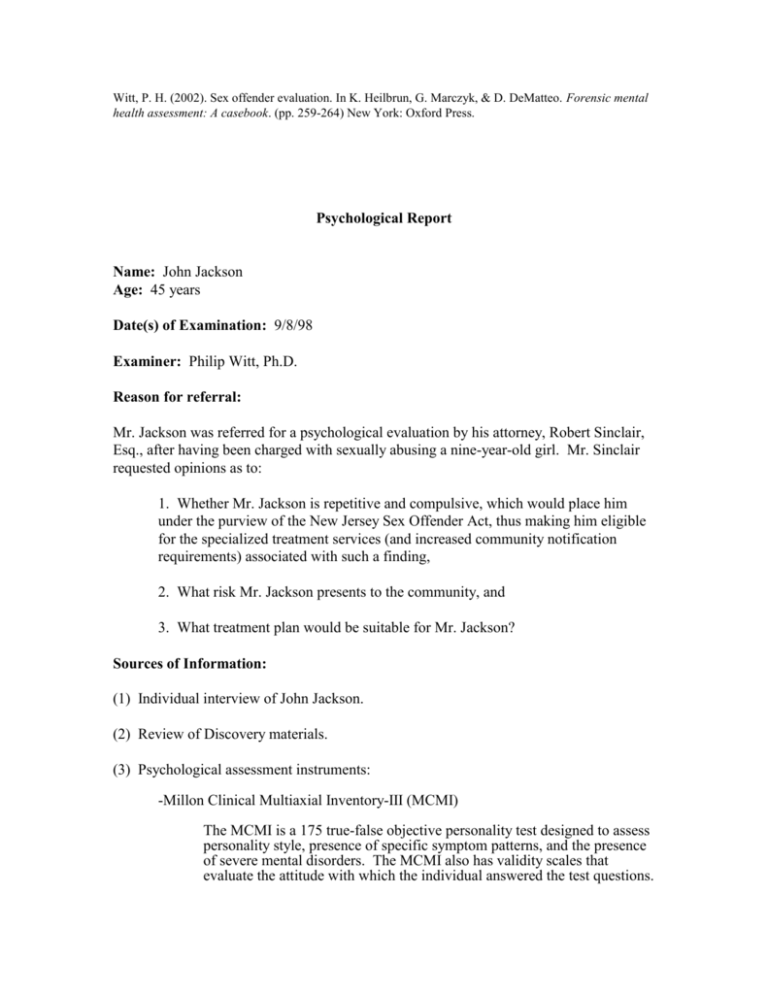
Witt, P. H. (2002). Sex offender evaluation. In K. Heilbrun, G. Marczyk, & D. DeMatteo. Forensic mental
health assessment: A casebook. (pp. 259-264) New York: Oxford Press.
Psychological Report
Name: John Jackson
Age: 45 years
Date(s) of Examination: 9/8/98
Examiner: Philip Witt, Ph.D.
Reason for referral:
Mr. Jackson was referred for a psychological evaluation by his attorney, Robert Sinclair,
Esq., after having been charged with sexually abusing a nine-year-old girl. Mr. Sinclair
requested opinions as to:
1. Whether Mr. Jackson is repetitive and compulsive, which would place him
under the purview of the New Jersey Sex Offender Act, thus making him eligible
for the specialized treatment services (and increased community notification
requirements) associated with such a finding,
2. What risk Mr. Jackson presents to the community, and
3. What treatment plan would be suitable for Mr. Jackson?
Sources of Information:
(1) Individual interview of John Jackson.
(2) Review of Discovery materials.
(3) Psychological assessment instruments:
-Millon Clinical Multiaxial Inventory-III (MCMI)
The MCMI is a 175 true-false objective personality test designed to assess
personality style, presence of specific symptom patterns, and the presence
of severe mental disorders. The MCMI also has validity scales that
evaluate the attitude with which the individual answered the test questions.
Jackson
2
-Multiphasic Sex Inventory (MSI)
The MSI is a 300 item objective personality test specifically standardized
on a sex offender population. Its scales measure qualities of relevance in
assessing sex offenders, such as extent of justifications of deviant sexual
practices, degree and type of deviant sexual fantasies and deviant sexual
behavior, presence of specific fetishes, presence of sexual dysfunctions,
and sexual history.
- Registrant Risk Assessment Scale
The RRAS is an instrument developed by the New Jersey Attorney
General’s Office to evaluate and place sex offenders in risk tiers. It
evaluates seriousness of the offense, characteristics of the offender,
characteristics of the offense, and community support.
- Adult Sex Offender Risk Assessment Schedule (ASORAS)
The ASORAS is a sex offender risk assessment scale developed by Robert
Prentky, Ph.D. of the J.J. Peters Institute in Philadelphia. The ASORAS
considers both static factors (such as a community adjustment, historical
level of sexually deviant preoccupation, and history of an impulsive,
antisocial lifestyle) and dynamic, changeable factors (such as
clinical/treatment factors) considered to be related to sex offender
reoffense risk.
Review of Discovery materials:
The records indicate that Mr. Jackson has been charged with one instance of fondling the
vaginal area of a nine-year-old girl; the girl reported digital penetration during this
offense. He has two prior sexual-related charges for exposing himself to teenage girls.
These prior charges resulted in probation in municipal court.
Interview of John Jackson:
Mr. Jackson presented as a tall, thin white male who appeared his stated age. He was
oriented to time, place, and person. His thought processes, as assessed through the
interview, were relevant and coherent. There were no signs of hallucinations or
delusional thinking, or of suicidal thoughts or intent. In summary, there was no evidence
of a thought disorder.
Throughout the interview, Mr. Jackson was open, verbal, and cooperative. He answered
all questions and provided information spontaneously, of his own accord. In fact, he
readily recounted his life history in detail, requiring very little prompting. Included in
this life history were a variety of actions that cast him in a non-flattering light, suggesting
Jackson
3
a high level of candor. He showed pressured speech; it was difficult to get a word in
edgewise once he began his account of his life.
In his junior year in high school, he began a romantic relationship with a female high
school classmate with whom he had sexual intercourse. By his senior year, however, he
was dating four or five different high school girls, approximately two to three of which he
had sexual intercourse with. He hid all of these relationships from his then-girlfriend.
During college, Mr. Jackson became by his own description even more sexually
promiscuous. He had sexual relations with scores of age-appropriate women, on more
than one occasion contracting sexually transmitted diseases. Throughout college, he
ostensibly had a steady girlfriend, but without her knowledge, he was having sexual
relations with a variety of other women. He also began frequenting massage parlors for
casual sexual encounters with prostitutes.
During high school, he began to engage in sports betting. By college, he was heavily in
debt because of his betting, and his father settled his debts on more than one occasion.
His involvement with gambling has continued intermittently to the present. He described
times when he would be obsessed with sports betting, on the phone continually with
bookies and forever looking for a big win that would recover his losses.
Mr. Jackson reported that since his early teens, he has felt sexually attracted toward
younger girls. On one occasion in his teens, he slept at his cousin’s home, and he went
into his cousin’s younger sister’s bedroom and masturbated in her presence.
After graduating college, Mr. Jackson attended optometry school, and during optometry
school, he visited massage parlors roughly every other week. At the same time, he dated
age-appropriate women. He eventually married his then-girlfriend. During his marriage,
Mr. Jackson increased his gambling and frequented massage parlors more often,
sometimes as often as four times per week. He then began masturbating while driving in
his car. He would cover his penis with a map or newspaper, pull over, and ask teenage
girls directions while sexually aroused. He occasionally exposed himself to adult women
as well; once he drove completely naked on the NJ Turnpike, obtaining change for his toll
from a startled female toll-taker. He convinced himself that he wasn’t harming anyone
(other than himself), so he continued this activity throughout his first marriage.
During 1990, his sexual compulsivity led to serious consequences—he was arrested for
lewdness. He had masturbated in his car while watching two teenage girls roller-skating.
One of the girls felt threatened, and she notified the police. He received probation on the
condition that he enter psychotherapy; unfortunately, he did not discuss his pedophilic
sexual urges openly while in treatment. Rather, he convinced his therapist that he was
guilty only of poor judgment—having been inadvertently seen masturbating in his car.
Through the 90’s, he frequented streets near local high schools, masturbating in his car
while high school girls were walking home from school. In 1993, he was arrested for
Jackson
4
exposing himself while in his car to teenage girls near a high school. This led to a charge
for exhibitionism, eventually pled down to municipal disorderly persons charges.
He then began psychiatric treatment with Martin Kraft, M.D. who prescribed Prozac. He
also began attending Gamblers Anonymous meetings, although he has had a number of
gambling relapses.
Unfortunately Mr. Jackson has had a serious relapse with regard to deviant sexuality.
This year he fondled the genitals of a nine-year-old girl under her bathing suit in his
swimming pool. He acknowledged digitally penetrating the girl during this incident. At
the time he was experiencing strong pedophilic urges, and he impulsively put his hand
under the girl’s bathing suit.
Mr. Jackson expressed distress regarding his actions. He considers himself to have a
serious sickness and appears highly motivated to do whatever necessary to prevent any
recurrences.
Psychological test results:
On the MCMI-III, Mr. Jackson presented himself in a negative manner. His self-esteem
is low. He views himself as having done many reprehensible things in his life and berates
himself as a result. He is a depressive, pessimistic man who has a bleak, negative view of
himself, his life, and the future. These characteristics were evident in his responses of
“true” to: “I’ve had sad thoughts much of my life since I was a child”; “I’ve always had a
hard time stopping myself from feeling blue and unhappy”; “I’ve never been able to shake
the feeling that I’m worthless to others”; and “Even in good times, I’ve always been
afraid that things would soon go bad.”
His MCMI results indicate that he has a deep self-defeating streak. He acts impulsively,
causing disruptions in his life and the lives of his loved ones. He finds it difficult to
control his rash, reckless acts, after which he experiences deep guilt and contrition. His
moods can fluctuate wildly, depending upon whether he has recently experienced some
unpleasant consequence of his impulsive actions.
On the MSI, Mr. Jackson displays a high level of sexual drives and interests; he appears
preoccupied with sex and acknowledges significant difficulty controlling his sexual urges.
He also reports a variety of thoughts and urges regarding serious paraphilias, focusing on
child molestation, sexual coercion, and exhibitionism. He reports interest in a variety of
lower-level paraphilias as well, including voyeurism, obscene phone calls, and bondage
and discipline. His MSI in general indicates a high level of paraphilic interest and
substantial difficulty managing his urges.
Risk assessment:
Jackson
5
On the RRAS, Mr. Jackson receives a score of 72, placing him at the upper limit of the
moderate risk range (37 to 73 points). He receives numerous points for seriousness of
offense, involving digital penetration of a young victim, and the extensiveness and
duration of his illegal sexual activity, involving years of gradually escalating
exhibitionistic activity focused on teenage girls and culminating in the instant offense
with a prepubescent girl.
On the ASORAS, Mr. Jackson received nine points, placing him in this instrument’s
moderate risk range (nine to 16 points). The bulk of his points – six – occurred on the
sexual drive/preoccupation factor, where he scored high. He has a long history of
compulsive sexual behavior, both legal and illegal. He received a few additional risk
points on the impulsive/antisocial personality factor, primarily as result compulsive
gambling, presently in remission.
Integration of findings and recommendations:
John Jackson is a 45-year-old optometrist presently charged with sexually abusing a nineyear-old girl. Mr. Jackson has a long history of sexual interest in minor females, which
has resulted in two prior charges for exposing himself to teenage girls. He has struggled
to manage his urges toward young females for many years. Unfortunately, his behavior
recently escalated to an offense involving physical contact with a young victim.
Mr. Jackson also has a long history of compulsive gambling. During high school, he
began sports betting, and by college, his father had to settle his gambling debts on more
than one occasion. He had to take a loan from his father ten years ago to settle additional
gambling debts. He has managed to avoid heavy gambling debts since then, although he
still has difficulty with strong impulses to gamble.
I will address the referral questions in turn:
(1) Is Mr. Jackson repetitive and compulsive?
Mr. Jackson’s pattern of illegal sexual behavior extends over a period of years and has
escalated in his current offense. On the sexual preoccupation factor of one risk
assessment scale, he scored quite high. His illegal sexual acts are clearly repetitive; these
acts have continued despite legal consequences and Mr. Jackson’s best efforts to cease.
Moreover, he has a history of compulsive sexuality in a variety of areas. Consequently, in
my opinion Mr. Jackson is repetitive and compulsive.
(2) What risk does Mr. Jackson present to the community?
On both risk assessment scales, Mr. Jackson scores in the moderate risk range. He
receives a score of 72 points on the RRAS, and a score of nine points on the ASORAS.
His risk total is higher than that of the typical probationer, more similar to that of an
individual incarcerated at New Jersey’s specialized sex offender treatment facility, the
Jackson
6
Adult Diagnostic and Treatment Center. His illegal sexual acts have escalated from his
exposing himself to minor females to his present hands-on offense.
(3) What treatment plan would be suitable for Mr. Jackson?
It is my opinion that Mr. Jackson requires intensive, long-term, sex-offender-specific
treatment. I recommend the following treatment plan:
1. Relapse prevention training: Mr. Jackson should complete relapse prevention
exercises designed to increase his awareness of the internal (emotional) and external
(situational) risk factors that led to his deviant sexual behavior. He presently has little
awareness of these factors, particularly of the internal factors.
2. Victim empathy: Mr. Jackson should complete victim empathy exercises. Such
exercises are designed to raise the awareness of the patient to the negative emotional
consequences that his actions have had upon the victim.
3. Sexual reconditioning exercises: Conservative treatment would require that he
complete sexual reconditioning exercises designed to help him disrupt and moderate any
deviant sexual arousal that might be present. Mr. Jackson reports strong pedophilic
urges, and he lacks the skills to effectively disrupt such urges.
4. Sex offender treatment group: Involvement in a sex offenders treatment group would
have a variety of benefits for Mr. Jackson. First, he would have a support group to whom
he could talk openly regarding his offense, a support group whom he would feel would
not reject him for having committed an illegal sexual act. Second, he would be able to
receive feedback from other offenders regarding his rationalizations and justifications for
having committed the deviant sexual acts. Frequently, such feedback has more impact
from other offenders than from a treating professional.
5. Individual psychotherapy: Mr. Jackson requires individual treatment focused on
broader personality issues, such as his reckless, stimulation-seeking interpersonal style,
which may be related to his offenses. His compulsive gambling is one indicator of this
problem and would need to be addressed in treatment as well.
6. Medication review: Mr. Jackson is presently being prescribed Prozac, an
antidepressant. I suggest that he be psychiatrically evaluated for a mood-stabilizing
agent—such as lithium—as well. His pressured speech in the interview and his history of
impulsive, excitement-seeking behavior and sexual compulsivity suggest the possibility
of hypomania, so a mood-stabilizing agent may be helpful.
7. Continued involvement in Gamblers Anonymous: Mr. Jackson has a long-standing
gambling problem. He has been productively involved in Gamblers Anonymous, and he
needs to maintain his involvement in a gambling-related support group.
Philip Witt, Ph.D.
Diplomate in Forensic Psychology, ABPP
Date: September 9, 1998
Jackson
7








